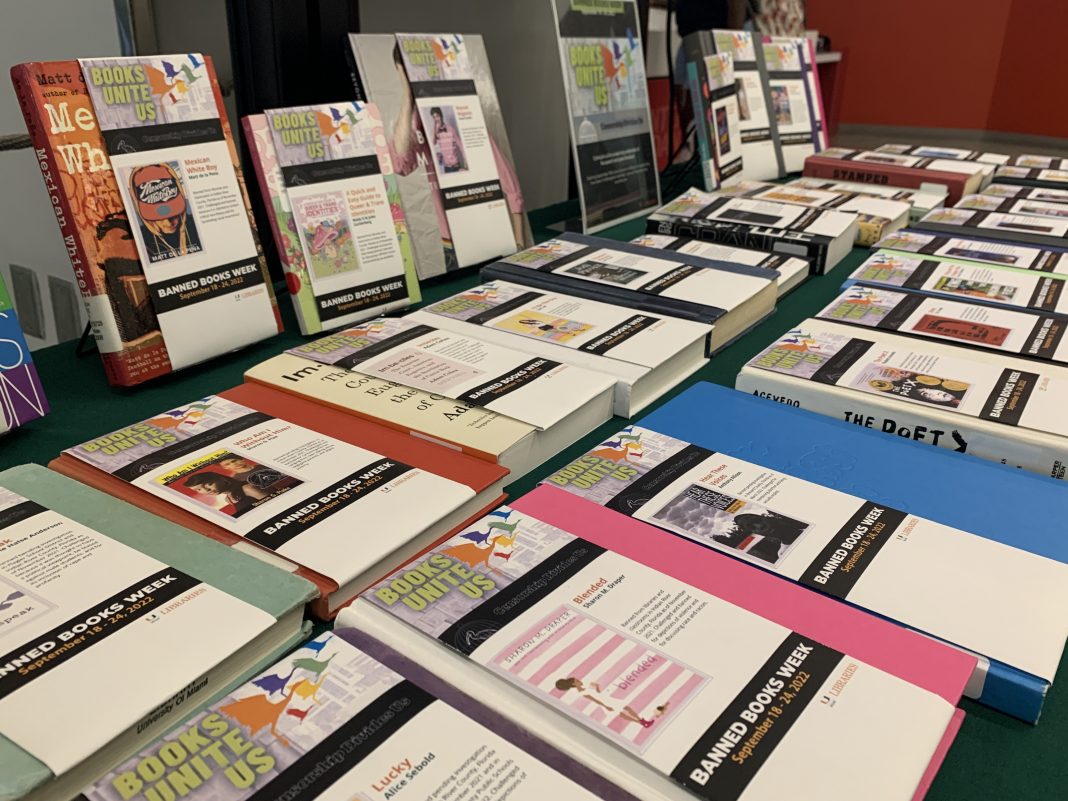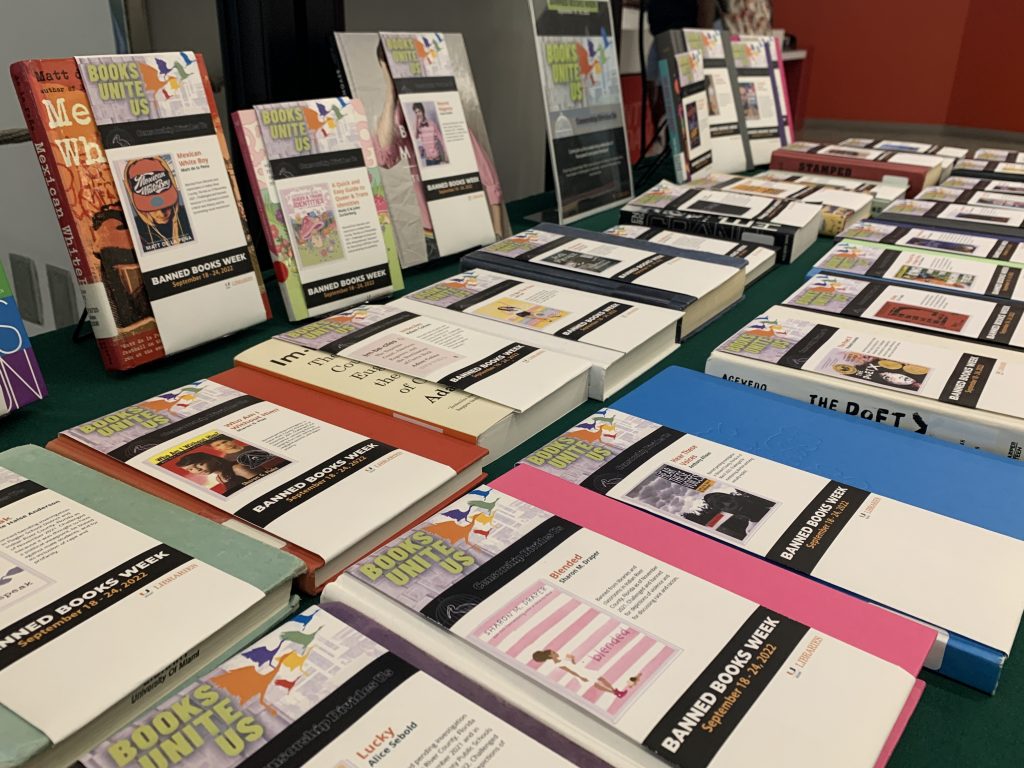

At a crowded, colorful table at the entrance of Richter Library, some of Florida’s most controversial banned books are proudly on display.
“Banned Books Week” is an annual, nationwide event that encourages people to read books that have been banned or challenged. It is a direct response to increased attempts at censorship across the country and runs from Sep. 18 to 24. Richter has worked to ensure it acquires banned books so that they may remain accessible to students and has set up an exhibit that lasted through the week in order to further promote awareness.
“The banned book exhibit is basically a list of titles that, at some point or another, were banned from certain school districts,” said Elisiene Jean, a University of Miami alumnus and current circulation manager at Richter. “The one that’s currently being displayed is very relevant to our society, because a lot of those titles were recently banned.”
Statistics on the Richter website for Banned Books Week suggest that books are being condemned in increasing numbers. According to the site, a record breaking 729 challenges have been issued to 1,597 books across the country. Critics mostly contest them on the basis of including LGBTQ+ content or for discussing race or racism.
“We have a banned book display almost every year, but this one was truly surprising,” Jean said. “Those books are from November 2021. This is recent. This isn’t even a year. So, how does the future look? In the spirit of progression, we shouldn’t be going in reverse.”
As a parent, Jean finds this year’s rising numbers especially worrying.
“I want my children to have the opportunity to read whatever they feel they need to read to enrich themselves,” Jean said. “I don’t believe you should censor a person’s enrichment.”
Julia Arwari, a junior public health major and a peer research consultant at Richter Library, has particular concerns about the kinds of books that are being targeted.
“There was an article posted with a list of over 200 books that were banned in Florida,” Arwari said, who helped set up the exhibit. “I went through the list and I checked which books the library didn’t have, because the librarians wanted to acquire all the banned books just so they’d be available to students.”
As Arwari read the list, she noticed a striking pattern.
“The trend I noticed when I went through the 200 books was that a lot of the stories discussed race, sexual violence, different religions, LGBTQIA+ topics, sexual education — very important and representative stories that the book ban is taking away from students,” Arwari said. “So, it’s a great thing that the library got them, so that students can be educated and read all these important stories, especially because the university prides itself on diversity and equity.”
She believes that book banning means to push a “less inclusive agenda” under the guise of protecting children.
“Far right extremism is more prevalent than ever, recently,” Arwari said. “A lot of politics, now, is based in misinformation. If you limit access to books, you limit people’s knowledge. It’s really, really sad. They want to take these books out of school because they think that these topics are inappropriate for children, but they can actually be very representative and educational.”
Arwari champions awareness as a solution and suggests that UM continue making banned books accessible. She also advocates speaking out against banning books.
Anjolie Scott, a junior English major, is an avid reader and a passionate decrier of book banning. She’s glad that UM is making strides to stand in solidarity with libraries that have seen their content challenged.
“I’m very happy that the exhibit is there in the library for everyone to see and that UM is making a statement and promoting knowledge and education like this,” Scott said. “With the amount of people that pass through Richter library, I hope they had a huge audience.”
Scott said that she believes the recent rash of censorship is borne of ignorance and fear of the unknown.
“I think people are afraid of what they don’t understand and that parents are afraid of having these conversations with their children,” Scott said. “They want to take away the freedom of choice from children, but we all have the right to think for ourselves.”
She hopes the exhibit’s upfront, tangible nature will make the issue more concrete.
“It’s super important to be aware of what’s happening in the country, as book banning itself promotes ignorance and prevents the spread of knowledge,” Scott said. “I think that having this display where you can see some examples of the books that are being banned is crucial. It’s giving people a good visual.”
Others, like Jean, are looking to the future. Professor John Funchion, who has worked at UM for 14 years and specializes in 19th century American literature, is specifically concerned about the consequences of reduced access to foundational literature on the next generations of students.
“In terms of the implications, especially since this is happening state by state and varies so greatly even community by community, I think that has tremendous implications for a university like UM, where we’re drawing students from, not just Florida, but from around the country,” Funchion said.
Funchion forecasts that students from Florida high schools may have difficulty keeping up with peers from other parts of the country, once they meet at the university level.
“Students are going to be arriving on campus in the future with incredibly divergent understandings of literary history and cultural history,” Funchion said. “I don’t think that’s going to put Florida’s high school students, either those that are coming to UM or who want to go to college elsewhere, necessarily on the best footing.”
To him, the exhibit at Richter and Banned Books Week at UM as a whole are emblematic of what universities should be doing to ensure knowledge remains accessible.
“I don’t think we want to live in a society where we’re being told what books we can and cannot read and what books can or cannot be accessible,” Funchion said. “I think it’s also an important reminder of what universities are supposed to be.”





